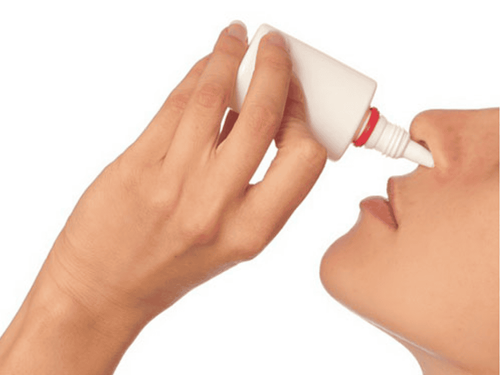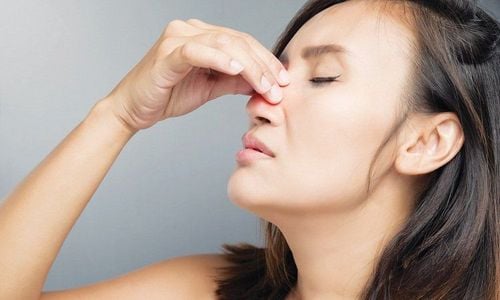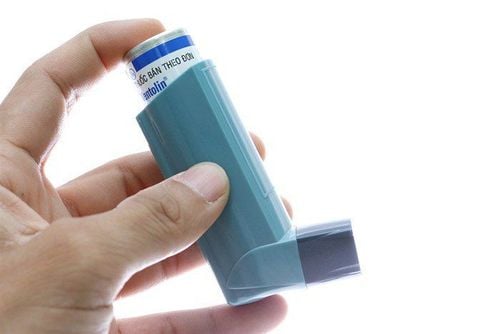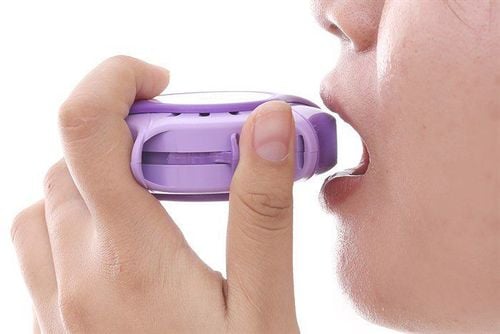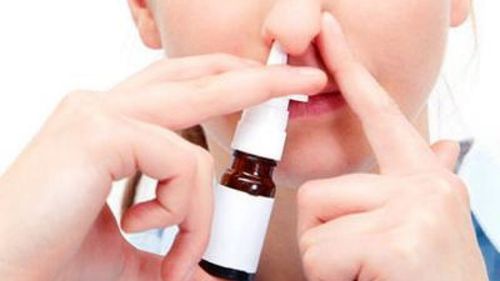This is an automatically translated article.
The article is professionally consulted by Master, Doctor Trinh Thi Thanh Huyen - Department of Obstetrics and Gynecology - Vinmec Hai Phong International General Hospital.
1. Symptoms of allergic rhinitis during pregnancy
1.1 What is allergic rhinitis during pregnancy? Allergic rhinitis is an inflammation of the nasal mucosa caused by exposure to respiratory allergens. Rhinitis during pregnancy is uncomfortable symptoms that occur in the nose during pregnancy, lasting for many weeks without other signs of a respiratory infection. This condition may completely disappear within 2 weeks of giving birth.1.2 Symptoms of allergic rhinitis during pregnancy When having allergic rhinitis, pregnant women may appear some of the following symptoms:
Sneezing continuously, may sneeze in episodes or long colon; Runny nose out or down the throat, clear, odorless nasal discharge; itchy nose, ears, throat, eyes, or itchy skin; Nasal congestion, possibly on one or both sides; Red eyes, dark circles or watery eyes; Headache, sore nose; Snoring, must breathe through the mouth; Dry cough, sore throat, cough with phlegm. Transient cases of allergic rhinitis in pregnant women usually do not directly affect the fetus. However, if not controlled, the disease can indirectly affect the fetus because the mother's health declines due to fatigue, stress, poor sleep, sore throat, chronic rhinitis. In addition, prolonged allergic rhinitis also reduces oxygen supply during sleep, reduces the amount of oxygen supplied to the fetus, causes fetal growth retardation in utero, and increases the risk of gestational hypertension and preterm birth. eclampsia. The constant sneezing and blowing of the nose by pregnant women also stimulate uterine contractions. Too much stimulation can lead to a threatened miscarriage or premature birth.
Therefore, when there are symptoms of allergic rhinitis during pregnancy, pregnant women need to notify their doctor for effective treatment.

2. Measures to reduce symptoms of allergic rhinitis during pregnancy
Some common ways to treat rhinitis during pregnancy include: Using Western medicine, using folk tips and using Eastern medicine. Regardless of the method chosen, pregnant women also need to be consulted by a treating doctor.2.1 Applying folk tips For cases of allergic rhinitis that have not changed seriously, pregnant women are encouraged to apply folk remedies using natural ingredients to ensure safety for both mother and baby. . Methods include:
Using herbs: Pregnant women can use safe herbs such as lemon basil, ginger, perilla, kumquat,... These herbs contain essential oils to help relieve sneezing symptoms. steam, runny nose, stuffy nose effectively. In particular, perilla is also a medicine for pregnancy and pregnancy; Fresh ginger helps reduce morning sickness symptoms such as nausea, vomiting; Lemon basil except sputum, beneficial lung, inhibit pneumococcal bacteria to help prevent and treat respiratory diseases effectively; Smell the onion: Onion has ingredients that fight the symptoms of allergic rhinitis such as difficulty breathing, sneezing, runny nose, ... without causing any adverse effects on the development of the fetus. pediatric; Nasal massage and acupressure: Helps push the amount of nasal secretions out, relieves symptoms of nasal congestion, helps to circulate the airways for pregnant women. This method also helps to reduce pain in the nose effectively for patients with allergic rhinitis. Cleaning the nose with salt water: Salt water has a bactericidal, anti-inflammatory effect, helps eliminate bacteria, effectively cleans the nose for pregnant women with allergic rhinitis. Other measures: Sauna, put a humidifier in the house, put a high pillow when sleeping, drink a lot of water, exercise, avoid stimulants, eat foods rich in vitamin C, keep warm foot,... 2.2 Using Western medicine Folk methods have high safety but are only suitable for mild allergic rhinitis. In case the disease has progressed to a severe stage, pregnant women need to apply other special treatment methods such as Western medicine. Commonly used drugs include:
Antihistamine group: Commonly used Cetirizine, Chlorpheniramine, Tripelennamine, Loratadine,... This is a group of drugs that help inhibit the activity of allergens, helping to reduce uncomfortable symptoms. of allergic rhinitis during pregnancy. Glucocorticoid nasal spray: It is a safe drug for pregnant women, has a decongestant effect, reduces nasal congestion. However, pregnant women should only use the drug at the lowest dose. Sodium cromolyn nasal spray: A saline solution used to instill or spray into the nasal passages, it is quite safe for pregnant women with allergic rhinitis. Decongestants: There are 2 forms of oral and spray. However, pregnant women should only use the spray form and should avoid using the oral form. When using western medicine, pregnant women with allergic rhinitis should strictly follow the instructions of the doctor, not arbitrarily use the drug to avoid harmful side effects to the health of mother and baby.

When using Oriental medicine, pregnant women need to strictly follow the instructions of the physician, do not arbitrarily buy drugs when not indicated.
Trắc nghiệm: Bạn có hiểu đúng về dấu hiệu mang thai sớm?
Các dấu hiệu mang thai sớm không phải chỉ mỗi trễ kinh mà còn có rất nhiều dấu hiệu khác như xuất huyết âm đạo, ngực căng tức,… Điểm xem bạn biết được bao nhiêu dấu hiệu mang thai sớm thông qua bài trắc nghiệm này nhé!
3. Measures to prevent allergic rhinitis during pregnancy
Pregnant women need to pay attention to the following issues to effectively prevent allergic rhinitis:Find out the allergen that causes allergic rhinitis to prevent the disease effectively; Keep the house, living environment always clean, cool, avoid moisture; Avoid using foods that cause allergies such as milk, eggs, seafood,...; Do not keep pets such as dogs and cats in the house; Keep your body warm when it gets cold, especially the neck and nose area; Clean teeth daily, brush teeth right after eating, before and after waking up; Masks should be worn when cleaning the house and when going out. Allergic rhinitis during pregnancy can have many adverse effects on the health of the mother and fetus. Therefore, when experiencing symptoms of the disease, pregnant women should see a doctor for proper examination and treatment. In particular, pregnant women absolutely do not arbitrarily use drugs if not prescribed because some drugs can cause negative side effects for mother and baby.
Pregnant women with allergic rhinitis can affect the development of the fetus. Therefore, mothers need to pay special attention to prevention during this period. The comprehensive maternity care program at Vinmec is scientifically designed with routine examination and testing schedules throughout pregnancy to help diagnose and treat early to avoid risks of harm to mother and baby.
Master. Trinh Thi Thanh Huyen is highly trained in obstetric ultrasound, laparoscopic surgery and hysteroscopy at the National Hospital of Obstetrics and Gynecology and has more than 13 years of experience working at Hai Phong Obstetrics and Gynecology Hospital.
Currently, the doctor is an Obstetrician and Gynecologist at Vinmec Hai Phong International General Hospital
Please dial HOTLINE for more information or register for an appointment HERE. Download MyVinmec app to make appointments faster and to manage your bookings easily.




